Real People: This is what it looks like to be homeless in Waterford City
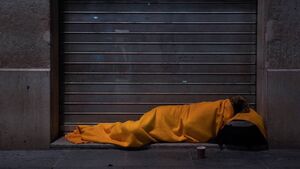
From access to accommodation to stigma, the Waterford News and Star learns what it means to be homeless in Waterford City. Stock Image.
At the top of the Maranatha church on Railway Square in Waterford is a little morning sanctuary for some of the most vulnerable in our city.
Waterford Helping the Homeless is a group of volunteers who provide meals, clothes, tents, sleeping bags and more to the homeless.
The Waterford News and Star visited the unit for breakfast recently and spoke to volunteers and service users.
When we visited, Waterford was under a Status Yellow weather warning for rain, but everyone there seemed content at the gathering.
One of the unit’s co-founders, Susie Moran, told us that they provide meals, supplies and a little break from the elements.
“It’s a few hours of laughing and joking and somewhere to go that is familiar, friendly and if they need anything, they can come to us. They are like friends. It’s not like I’m the boss. We are all the same,” said Susie.
And it is not just the homeless who use the service.
Anyone on their own and lonely or those who cannot cope with the cost of living are welcome.
Susie estimates that 90% of those who come for breakfast are Irish, with 10% foreign nationals.
Volunteer Alan said that when he was homeless three years ago, the unit helped him, and now he returns to help them.
One of the estimated 200 people who use the service, Dylan, who has been homeless for two months, said that he doesn’t know what he would do without the unit.
“We would all be dead if it wasn’t for this place. There is no way to get food in the morning- not until 6.30pm in the evening.
"There is no way to get a cup of tea. So if it wasn’t for this place, we would be dead,” said Dylan.
Those who spoke with us appeared relaxed and in good form and even asked if their photos could be taken.
But, outside, the rain was beating down the roof.
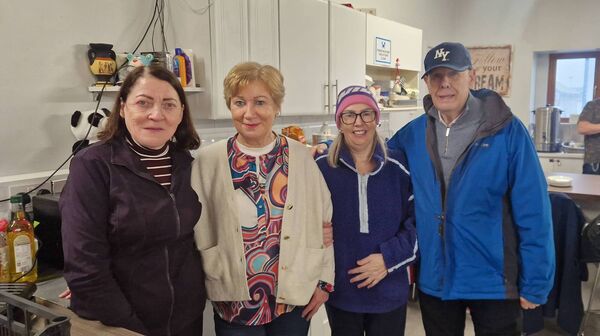
Come lunchtime, the unit would close for the day, and volunteers would go home and the service users back on the street.
Most of the homeless people at the unit rely on the 9-9 accommodation service run by the council.
That means that they only have a roof over their heads between the hours of 9pm and 9am the following day.
The rest of the time, or if a person cannot secure a bed for the night, they must stay out on the street.
Dylan told us that he only secures a bed around 50% of the time.
He described being frozen over as he slept outside.
“There are days I have woken up, and this snoodie would be frozen to my face, and I have to pull it off my face and break the ice on my arms. You are in freezing temperatures. The guards just walk past you.
“That night I was out in the freezing cold, I was properly frozen over. I didn’t see any outreach team. The guards completely ignored it. The only good thing is you can come here in the morning, but then you are back out again,” said Dylan.
Dyan is aware that questions of whether the council have enough beds are being asked at the council and that councillors are told there are.
But, he said he believes that the staff manning the accommodation “pick and choose” who gets in.
And, sometimes he isn’t even allowed to put his name down.
“I’ve been out four or five nights in a row. I put my name down last night. They said no place for you and wouldn’t let me do it. No reason for it,” said Dylan.
The night Dylan is referring the weather was too poor to sleep outside.
He paid to stay in a private B&B that night out of his social welfare payment.
It cost him €80 of his €200 to get him through the week.
According to council figures released to the Waterford News and Star, under the Freedom of Information Act, there are 81 emergency accommodation beds and eight out-of-hours beds available to the council.
That consists of 47 units in McGwire House (39 9-9 and eight out-of-hours beds) and 42 commercial emergency accommodation units.
In their response to our request, the council said of the commercial beds, 24 are currently used on average.
Co-founder Victor O’Sullivan, who runs outreach for the unit told us that he regularly assists people on the street who have been unable to secure a bed for the night.
“Yet they are saying there is plenty of emergency accommodation. There is not because if there was, why are there four or five of our lads left out all the time? That is a big big thing, said Victor. When we spoke to him, he had recently paid a local hostel to take a man who had been injured and robbed.
Waterford Helping the Homeless paid for the man’s accommodation for the night out of their own funds, and Victor showed us the receipt.
“I rang the hostel and asked if there was anything you could do about it. She said no, and I said why not? There is supposed to be a storm tomorrow- oh he has no money to pay, and it's €80. So I said, will you let him pay it over the next few weeks- oh no, we can’t do that. I said if I come over and pay it, will you let him in- so I went over and paid the money,” said Victor.
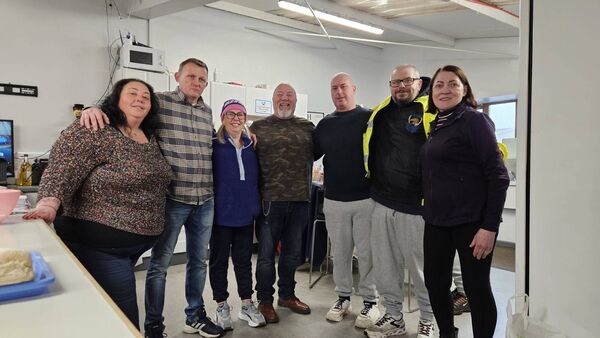
Alan told us that when he was homeless, he had to find alternative ways to stay off the streets.
“When I was homeless three years ago, I had to find a way of getting off the street, and I stayed in the garda station for months. It wasn’t a good environment for my mental health.
“So when I left there someone suggested to me that there is a bus that goes at 1:30am to Dublin, and it worked. I was back from Dublin at 5:30am. I did that for a while just to improve my situation, but really nobody should be in a position where they have to use desperate measures to stay off the streets,” said Alan.
Injuries and robberies are a regular occurrence for the unit’s visitors.
Dylan told us that he knows of one man who was robbed twice in a hostel but was told the CCTV was not working and so was unable to take the matter further.
He said if one is “jumped” and fights back, they will be charged with assault.
In fact, Dylan believes that not tackling the homelessness crisis is creating charges and crimes that are not happening.
“There is one thing [politicians] completely dismiss. They are kind of enabling people to get charges with the guards. They are leaving them outside. They are leaving them sitting outside the hostels, and some fellas come up and try to jump you- you have fought back, and then you get a charge, and they say, oh our CCTV is down,” said Dylan.
Cameras are not the only facilities not available to Waterford’s homeless.
Dylan told us that if you can get into the hostels, you won’t be able to use the showers.
Sometimes, he is told they are out of order. Other times, no reason is given at all.
“Most of the time in the hostel as well, you can’t actually shower. A lot of the time they are out of service or they will be like oh no, you can’t use the shower today. Like I haven’t been able to have a shower in a week. I used to be an extremely hygienic person, so it kills me,” said Dyan.
Nobody could disagree that the homelessness crisis exists in a wider context.
That context is a series of interconnected public service shortages.
And one of those is the mental health crisis.
Alan told us he feels the homeless are just forgotten.
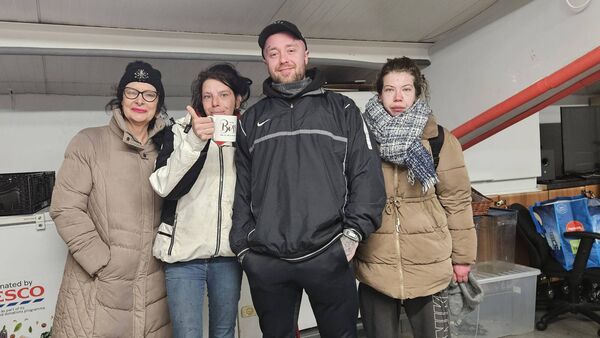
“I just want to say the people who are homeless are real people. I feel like they are forgotten; they are just pushed aside. Every individual has the right to a home and a place to eat, you know what I mean. These are very important things. All we are asking for our government to do something about it,” said Alan.
Susie said that she has personally taken people to the hospital in the middle of an episode of psychosis, only for that person to be released an hour later.
Dylan said you come out of the services “worse than you went in.” So it’s no wonder these people suffer.
Dylan said the public has a terrible idea of the homeless, and the stigma is a major issue for those stuck on the street.
He said the guards move them on from sleeping in doorways and send them out to the hospital to sleep.
And when they go into shops to warm up, security guards tell them to leave.
It is as it is assumed they are up to no good.
The result of this is that people in homelessness suffer in both body and mind.
Susie said many of the people they look after suffer from injuries and conditions like trench foot.
And the care of these conditions falls to volunteers.
“People think this is teas and coffees, but it’s not. You are in here, you are a nurse, a counsellor, you are a mother, a negotiator, a leader- you are everything,” said Susie.
Victor pointed out that homeless people in severe weather events are less than what is expected for a dog.
“Don’t they tell people when there is a storm, bring your animals in. Well, what’s up with bringing people in? Doesn’t matter once they have a roof over their heads,” said Victor.
“They are not animals; they are actually people,” said Susie.
Waterford Helping the Homeless receive no state assistance to provide the service, and nobody at the unit was being paid.
The unit, Susie explained is run on the generosity of the public and the Maranatha Church, the public and groups like Surprise Surprise in Dungarvan and Christ on the Street.
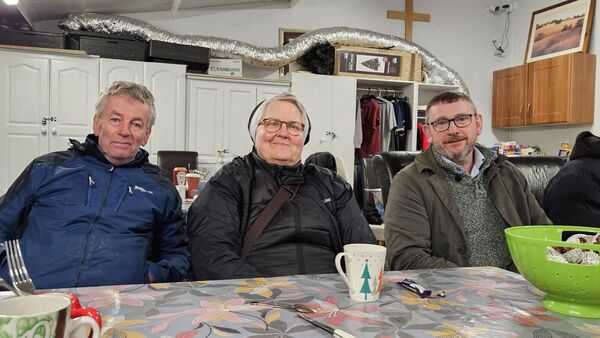
“Just to make the public aware, we are in Railway Square.
"We are here seven days a week for anyone in need to come to us. We offer friendship and there is no judgment to anyone who comes in the door.”
Victor says there are members of the public, like Billy O’Sullivan and Philly O’Brien, who provide assistance to homeless people in the city, and for that, they thank them.
“Only for the public, we wouldn’t be here. This wouldn’t be here, we wouldn’t be able to continue,” said Susie
Waterford Helping the Homeless has been in operation since 2019. They operate seven days a week, 365 days a year.
They provide breakfast six days a week for around 25 people at a time, and on weekends they provide dinners too.
Susie said the number of people who need their service has increased significantly since January.
“At the start, there used to be 15 or 16 in the morning. Now, every morning we have 25 since January. I don’t know what has at to happening. It’s crazy,” said Susie.
Susie and the team may not know why demand is increasing, but they do know what needs to be done to meet it.
Susie told us that while the public is very generous, they do need more support from our public representatives.
She and Dylan said that when people go to the Integrated Homelessness Services on Parnell Street, they fill in a form and then are referred to Waterford Helping the Homeless.
However, Parnell Street does not provide any support to the voluntary service.
“We love that the lads come to us and that they can, but it’s easy for them to send down people to us when they won’t send down a three-litre carton of milk with them,” said Susie.
Susie told us the unit costs around €300 a week to run.
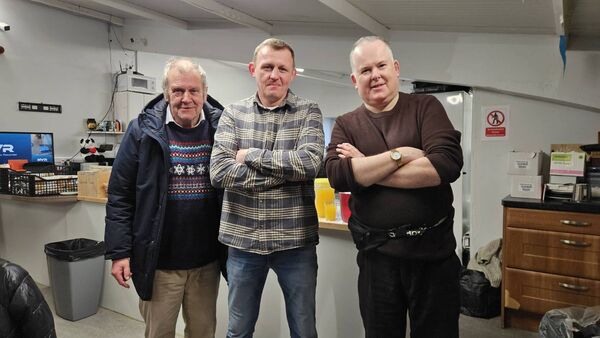
That is food and electricity costs but doesn’t include, tents, sleeping bags, socks, underwear, toiletries or anything else the lads need.
She said that following a fundraiser, the group spent more than €2,500 on tents, most of which ended up being thrown out when pitched.
They need the council to help support their service users with their basic needs.
Alan told us that he thinks it would make a big difference if the Mayor would visit the unit and see what it's all about.
“Our Mayor- all we want is for him to come down, sit down and have a cup of team and a talk with us and everybody here and find out about us like anyone else, fit in and have a talk, said Alan.
Susie said she would like any public representative to visit.
She said she had sent out invites but to no avail.
Lastly, Waterford Helping the Homeless is requesting of the council a place where their service users would be able to sleep.
Susie and Victor say their group will man it.
All they need is a place to stay.
“Because this is so important. Like this weather, someone is going to end up dead on the street and as I said, these are our friends; they are not just the homeless they are our friends, and we want what’s best for them,” said Susie.
Waterford City and County Council were contacted for comment on the issues raised in this report.
In response, they advised us to submit a request under the Freedom of Information Act 2014.






